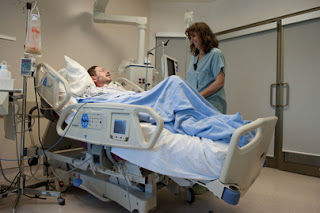No Wrong Side To This Bad
US researchers have created a smart hospital bed that is aware of its surrounding. The intelligent bed will make important decisions regarding the patients' healthcare which will involve both improving and saving precious lives.
 |
| A prototype of the smart bed that is being tested at the University of New Hampshire could revolutionise health care In the future |
John LaCourse, professor at the University of New Hampshire, is currently negotiating with hospital bed manufacturers
to adopt his prograq~.med algorithm, which could become the basis for computerised hospital beds.
These smart hospital beds would communicate with and respond to medical devices that monitor a patient's condition.
"Perhaps a sleeping patient moves, causing a drop in blood pressure. The blood pressure monitor would communicate
this change to the bed and the bed, in turn, would move up or down until the patients' blood pressure is stabilised," he says.
IMPROVED POST-SURGERY CARE
Post-surgical needs may also be met with this bed. "Procedures such as retinal surgery require exact blood pressure levels," says LaCourse. "A smart hospital bed would adjust itself to maintain these levels for patients."
Even quality-of-life conditions such as bed sores could be addressed. "Instead of requiring hospital staff to move the patient, monitors could send signals to the bed to roll the patient to his left or right to avoid bed sores," says LaCourse.
"Microprocessors installed into the bed can also sense respiration patterns to determine when breathing has ceased, the bed moves in such a way that the breathing resumes," said Jonathan Waters, who is working on modifying the bed for sleep apnoea.
PLUG AND PLAY
The ultimate success of LaCourse's project rests with the plug-and-play component. Plug-and-play means that medical devices – everything from blood pressure monitors to breathing machines- "can talk to each other and share patient information which greatly reduces care errors," explains LaCourse.
To realise plug-and-play capability, however, LaCourse's technology must become the industry standard for hospital bed manufacturers. 1n this way, medical devices could seamlessly connect to and exchange patient data.
LaCourse is hopeful that, within two to three years, his technology may be accepted by most if not all hospital bed companies.




















0 comments:
Post a Comment
Please do not spam Spam comments will be deleted immediately upon my review.